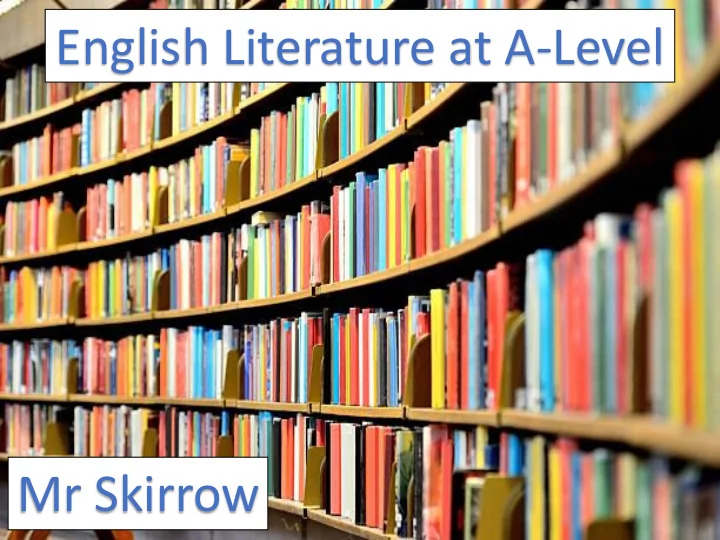

English Literature at A-Level Mr Skirrow
Who are you? Well, you’re hopefully somebody who understands that writers are trying to answer that question with their work – someone who believes that stories can teach us deep and meaningful truths about our lives and encourage us to think about the world in new ways. It’s also important that you don’t mind reading a few books. You have hopefully enjoyed some of the Literature you’ve encountered at GCSE like Shakespeare and (at least some of) the Poetry Anthology, and wouldn’t mind tackling some more adult themes! Somebody who sees an essay and thinks ‘yess - ay’. You should recognise that an essay gives you a chance to explore and express your ideas, and that the process of writing essays actually helps you to become a better thinker.
Who are you? Someone who has opinions on what they read and would be happy to share them in a group of passionate like-minded students. It really isn’t all essay based and the discussions can get quite heated at times! Someone with ambition. English Literature is what’s known as a facilitating subject , meaning that universities understand it is a subject with a lot of academic rigour. This means it can make your UCAS application more competitive, and can complement a wide range of subjects. Somebody who understands that literature can teach us about the time period, and finds the windows that books can provide into other lives really quite interesting to peep through.
Where can it take you? Fairly obviously, lots of English graduates go on to have a massive impact in the Arts industry, creating meaningful work that tries to say something about our lives. But there are some more surprising career options available… To be honest I’m not sure what Adrian Chiles does, but he Journalist Nobel Prize winner MP for Medicine does have a degree in English Literature as well! CEO of Avon
Who are we? A fairly lovable group of book nerds who love debating and discussing texts with students and who get good results with their classes – English Literature is frequently one of the top subjects (if not the top) in terms of results and progress in the school. Lots of enrichment! Trips to the theatre… Author talks at the Cheltenham Literature festival… Rotary Club Public Speaking Competitions… …even helping to judge our Year 7 Poetry Slam!
Lots of support Tutorials Marking Additional support
What will I be studying? Your A-Level will contain three components. Why would you give us a topic so miserable? Aren’t you trying to get people to take the course?
The genre of tragedy originated in Ancient Greece and continues to massively influence art and literature today. By exploring tragedy and suffering, we gain a deeper understanding of what it means to be human. You’ll already know several conventions of this genre! Hidden secrets that tear characters Moments of realising and families apart… the error of your The noble hero ways… whose character flaw Once you start seeing tragic conventions in leads to their stories, it’s really quite difficult to stop. downfall…
Death of a Salesman – Arthur Miller’s searing 20 th Century takedown of the American Dream. King Lear – my personal pick for Shakespeare’s finest work. A chaotic mix of pride, storms, families torn apart, poisoning, eye-gouging, jealous bastards, evil daughters and all out war. An absolute cracker. Poetry of Keats – John Keats is one of our country’s greatest poets and one of the ‘big six’ Romantics (you might have already come across Byron and Shelley!). His narrative poems feature wandering knights, men hiding in closets to spy on their beloved, women planting severed heads in pots of basil and snake-demon women trying to stage the perfect wedding day. A wild ride.
SOCIAL AND CRIME PROTEST FICTION WRITING
It should be quite clear that this is a course that asks you to look at texts through different lenses, e.g. genre conventions and subject matter. This is especially true in your non-exam assessment which asks you first of all to read an anthology of critical perspectives. Does the How does this text presentation of represent the Lady Macbeth struggle between reveal Shakespeare classes? is a secret misogynist? Is it OK that the Who chooses what only black character we study, and why in Jane Eyre is a do we mostly study mad woman in the books by dead attic? white guys?
It’s then over to you for more choice – you have to write about two texts of your choice (one poetry, one prose) from a critical perspective… How far does Angela Carter subvert traditional representations of women in The Bloody Chamber ? How is the decline of the natural world presented in the poetry of Phillip Larkin? This doesn’t even have to be in the form of an essay: many of our students take the opportunity to produce some creative writing and a commentary here if that sounds appealing…
Have you got a handy diagram of how all that fits together?
In summary… - If you believe studying Literature has value… - If you like choice… - If you like debates and discussions… - If you like reading… - If you want a more appealing university application… - If you don’t shy away from a challenge… - If you want to work with teachers you know offer support and guidance… - If you want to explore texts from outside the British Isles… - If you are interested in what it means to be human… - If you are on for a Grade 5 in the summer… CHOOSE LITERATURE
Do I get a chance to ask questions? Of course – this is that chance!
Without wanting to tip into full gameshow, we are offering some book tokens tonight for those who’ll tell us why they’re interested in English Literature in the first place. Make sure you post your entry slip to be in with a chance!
Recommend
More recommend